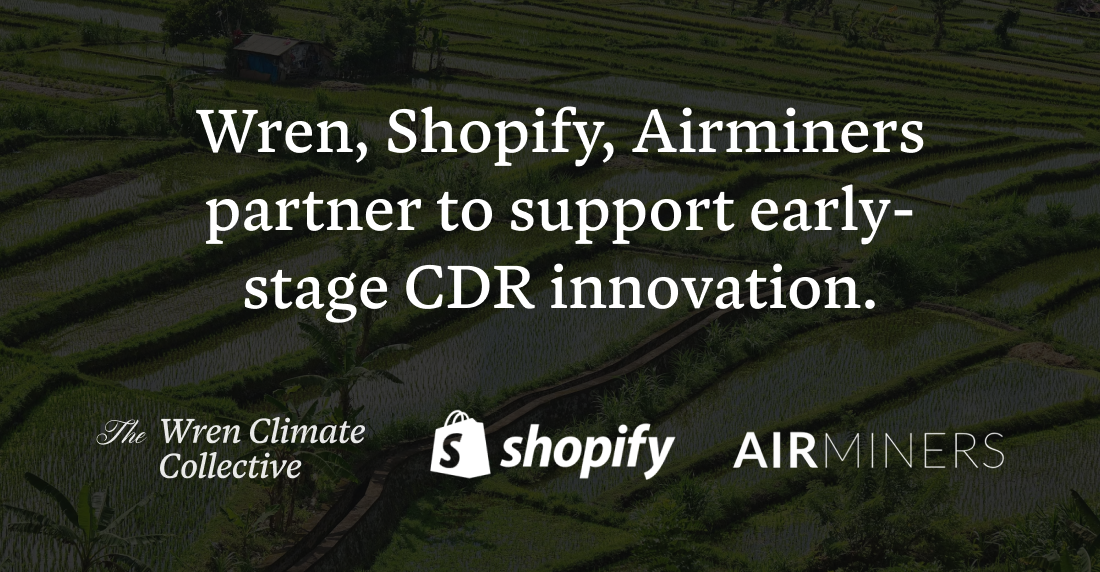AirMiners Kiloton Fund Teams Receive $100,000 in Grants from Wren Climate Collective, Offtake Agreements from Shopify
Wren has selected three carbon removal startups from the AirMiners Kiloton Fund to receive $100,000 in grants from the Wren Climate Collective.

Wren has selected three carbon removal startups from the AirMiners Kiloton Fund to receive $100,000 in grants from the Wren Climate Collective. This announcement, coming during New York Climate Week, highlights the growing role of philanthropy in supporting breakthrough carbon removal technologies, a key solution to tackling climate change.
In a time when capital is becoming scarcer, this kind of philanthropic support provides a vital boost to early-stage startups. Wren's funding complements other financial support, like Shopify’s recent $100,000 offtake agreements with every startup in the Kiloton Fund. Together, these contributions are helping carbon removal innovations scale faster.

“We believe that philanthropy plays a crucial role in unlocking the potential of carbon removal technologies. These startups are working on the frontier of climate innovation, and we’re thrilled to support them as they scale their solutions.”
Benjamin Stanfield, Wren Co-founder
Tito Jankowski, CEO of AirMiners, added: “Carbon removal is a climate solution and a rapidly growing market with real business opportunities. Philanthropic support, from organizations like the Wren Climate Collective, plays a key role in accelerating innovation at this critical stage, helping startups scale and seize those opportunities”.
More about the grant recipients:
Lillianah
Founded in 2021, Lillianah Technologies focuses on removing atmospheric CO2 by sinking phytoplankton (diatoms) biomass in the ocean. Phytoplankton are photosynthetic microorganisms that capture CO2 during photosynthesis and convert it into organic carbon. When their biomass sinks, CO2 is removed from the surface ocean. Lillianah accelerates this process by using diatoms that grow silica shells, which sink to form long-term marine sediments—similar to how ancient phytoplankton created oil and gas reservoirs.
Samudra
Founded in 2022, Samudra Oceans focuses on carbon removal by farming tropical and temperate seaweed. The seaweed absorbs carbon as it grows, and at maturity, it is harvested to seed further growth, creating a continuous cycle of carbon uptake.
Samudra plans to stabilize and store the captured carbon as biochar using hydrothermal carbonization, converting wet seaweed biomass into stable char. This biochar will be stored in agricultural fields or mines, providing long-term carbon removal while improving soil health by enhancing nutrients and water retention. The current removal method is rated for 100 years, with potential for longer-term storage.
HyveGeo
Founded in 2022, HyveGeo removes atmospheric CO2 by farming microalgae with wastewater on unused desert land and converting the biomass into biochar through pyrolysis. The pyrolysis process is powered by a closed-loop system that recycles syngas and heat, achieving net-negative emissions.
Microalgae grows rapidly, converting 1.8 tons of CO2 into 1 ton of nutrient-rich biomass. For every ton of biochar produced, 3 tons of CO2 are sequestered, with a permanence exceeding 1,000 years. The biochar is then used for desert soil remediation, improving soil structure, water retention, and nutrient availability, transforming desert sand into fertile land for sustainable local crop production.
HyveGeo also produces sustainable alternatives to chemical products, such as biofertilizers, biostimulants, and biopesticides, while providing soil remediation services that act as carbon sinks by enhancing soil microbial activity and boosting local agriculture.
More about the Wren Climate Collective:
The Wren Climate Collective (WCC) is a donor community funding early-stage CDR innovators to build & scale climate solutions. The WCC is a 501(c)3 non-profit sister organization of Wren Climate, PBC, and donations are tax-deductible in the United States.
More about Airminers:
AirMiners is a community dedicated to fostering innovation in carbon removal. Founded in 2017, it connects entrepreneurs, scientists, and innovators who are developing technologies to capture and store atmospheric CO2. Through programs like the AirMiners Kiloton Fund, it supports early-stage startups by providing access to capital, mentorship, and a network of over 2,500 members. AirMiners also runs regular events, including deep dives into carbon removal technologies and discussions with investors and experts, aimed at accelerating progress in the field.

